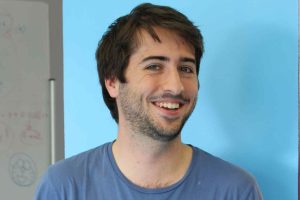The new IMSE generation is making waves! One of the first graduates from the IMSE Molecular Science and Engineering MRes, Victor Riesgo Gonzalez, is now working on a PhD in energy materials at Cambridge, and he’s published his first paper as first author.
Victor’s career to date
Victor Riesgo Gonzalez had a degree in Chemistry from Zaragoza (with an Erasmus year at Heidelberg) before he joined the IMSE MRes in 2017-18, its first ever year. At the time, he wanted to gain a broader understanding of the challenges in the chemical industry, as well as the approaches needed to tackle them.

At Imperial, he developed models for describing the phase behaviour of mixtures containing low molecular weight carboxylic acids, working with George Jackson and Niall Mac Dowell, in collaboration with BASF, where he completed an internship.
From the MRes he started a PhD position the department of Chemistry at the University of Cambridge, where he started in 2018. He’s working on the synthesis of new materials for batteries and (photo)electrocatalysts, in the groups of Professor Dame Clare Grey and Professor Dom Wright. In 2022 he published his first first-author paper in the journal Inorganic Chemistry (DOI: 10.1021/acs.inorgchem.2c00403), which describes a method of synthesising a Zr film catalyst to split water into O2 and H2 for fuel. Generally, he’s interested in the single-source deposition of mixed-metal oxide films from molecular precursors and their use in energy-related applications. Particularly, he is currently focusing on their use as coatings in new-generation cathode materials with the aim of extending battery life.
What’s your core scientific interest?
The synthesis of new materials for energy applications and the study of their structure – property relationships combining diffraction and NMR.
How did the IMSE MRes prepare you for what you do now?
The taught modules gave me an overview of modern aspects of materials chemistry that helped me understanding the state of the field and choosing PhD research projects. Furthermore, the industrial placement gave me an awareness of the current interests and challenges in the chemical industry. Finally, the research project allowed me to improve my data-analysis and scientific writing skills which was useful later on.
What is a typical day like for you in your current work?
On a typical day of work I do a range of activities including synthesis, electrochemistry, and characterisation using a wide variety of techniques including electron microscopy, solid state NMR and diffraction. I frequently collaborate with scientists from different backgrounds and I enjoy discussing and learning about the incredible range of topics in which people do research in my groups.
What attracted you to this work?
General fascination with chemistry and research. I found the challenge of gradually developing and understanding new compounds and materials through research especially rewarding. Furthermore, working in battery research is gratifying due to their current technological relevance as we move away from fossil fuels.
Do you know what you want to do next?
I plan to follow a career in academia and my next step is to find a postdoctoral position.
This is IMSE making a difference
We are immensely proud of all our alumni and we are always excited to see what they go on to do next. The MRes was designed to equip students to work in cross-disciplinary projects in industry and academia. Victor’s career is one way to do this. What might yours be?